Cross Spread
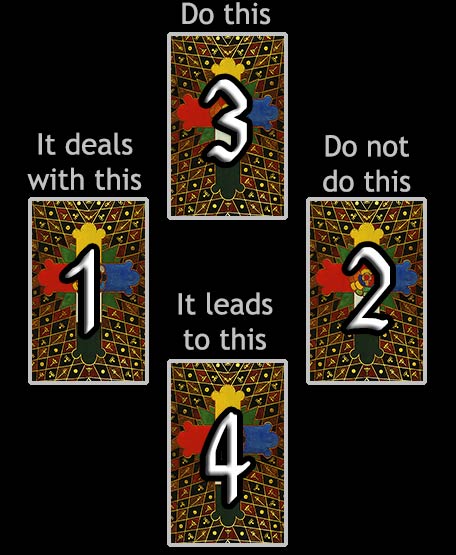
Difficulty: Easy
The Cross Spread is good for questions asking for advice. It can also be used to determine the meaning of a confusing card from a previous reading, or for that matter, to shed light on other points of confusion.
In questions asking advice, this tarot spread is self-explanatory. The main thing is to determine the difference between cards #2 and #3. #1 is the topic and #4 is the result.
In questions regarding confusion, such as: "What was the meaning of Card (X) in the last spread?" the main thing is also to determine the difference between cards #2 and #3. In this case, #2 will show what the card was not referring to, and Card #3 will show what was really meant. Card #1 is the topic and #4 represents the purpose it serves.
Your Cross Reading
DO This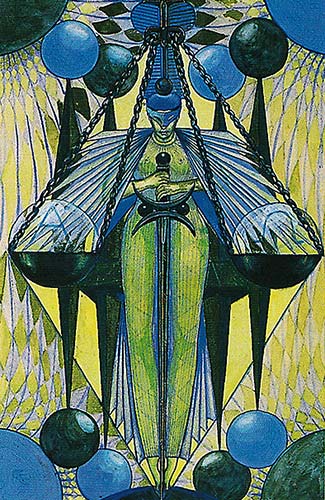 VIII – Adjustment |
||
It Deals with This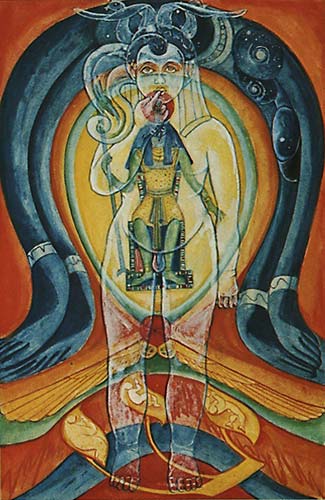 XX – The Aeon |
Do NOT Do This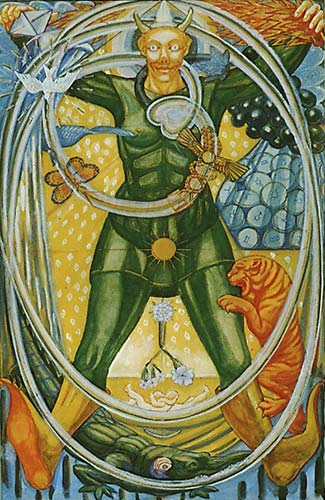 0 – The Fool |
|
It Leads to This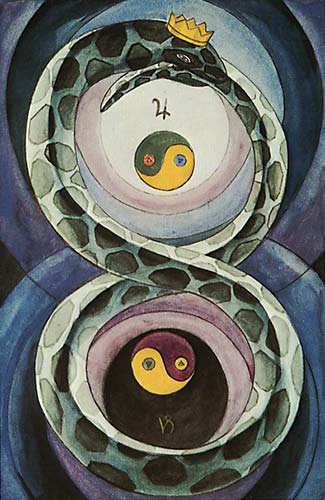 Two of Disks (Change) |

It Deals with This
XX – The Aeon
(Judgement, Fire, Shin)
The Aeon represents transformation, evolution, and the awakening to a higher state of consciousness. Associated with Shin, the tooth, this card reflects the process of breaking through old paradigms to embrace a new spiritual era. Crowley's reinterpretation of Judgement as The Aeon emphasises rebirth on a cosmic scale, rather than individual reckoning.
The central figure is the translucent child-god Horus, representing the dawn of a new age. Above him, Nuit, the goddess of infinite space, arches across the sky, and Hadit, the fiery point of divine inspiration, burns at her core. The two incarnations of the same figure symbolise the transition from the old to the new. The vibrant reds and blues throughout the card evoke the dynamic forces of destruction and creation.
In Relationships: The Aeon signifies the potential for profound change. It suggests leaving behind outdated patterns and embracing a higher level of connection and understanding.
In Work: This card indicates a turning point, calling you to align with your true purpose and embrace transformative opportunities.
Spiritually: The Aeon symbolises awakening to a higher state of being. It calls you to release the past and step into your divine purpose with courage and clarity.
When ill-dignified: The Aeon warns of resistance to change, clinging to outdated beliefs, or fear of transformation. You are advised to trust the process of renewal and embrace the potential of the new era.

Do NOT Do This
0 – The Fool
(Air, Uranus, Aleph)
The Fool of the Thoth deck embodies the chaotic, boundless energy of pure potential, untouched by form or limitation. He is the alpha and omega of the journey, the primordial force from which all creation arises. Corresponding to Aleph, the breath of life, and the element of Air, the Fool represents the vibrant, unpredictable nature of Uranus, the planet of sudden change and divine inspiration.
The figure of The Fool is richly adorned, standing amid a swirling maelstrom of symbolic forms. He wears motley robes to represent his openness to all experiences, while the winged sun at his feet symbolises the life-giving power of the divine. Around him whirl a tiger (representing instinct and primal fear), a crocodile (a guardian of the mysteries and a symbol of time), and a rainbow-hued disk, representing the harmony of all elements. The Fool holds a blazing torch in one hand and a crystal cup in the other, signifying the balance of will and receptivity. One foot is grounded in the world, while the other stands on the fourth wall, as if attempting to step into our world.
In Relationships: The Fool represents the potential for new beginnings and uncharted emotional experiences. It encourages you to approach relationships with innocence and trust, unburdened by fears or preconceptions.
In Work: This card advises bold action and faith in one's ideas. It suggests venturing into unfamiliar territory and taking inspired risks, understanding that growth lies in embracing uncertainty.
Spiritually: The Fool symbolises the seeker's initial step on the path to enlightenment, an act of surrender to the cosmic current. It urges you to trust the process and let go of the need for certainty.
When ill-dignified: The Fool warns of chaos, recklessness, or naivety. You are cautioned to discern whether you are pursuing freedom or fleeing responsibility and examine whether your actions align with higher wisdom.

DO This
VIII – Adjustment
(Libra, Lamed)
In the Thoth deck, the card traditionally known as Justice is renamed Adjustment, reflecting the dynamic nature of balance and the constant recalibration required to maintain harmony. Associated with Lamed, the ox-goad, it represents the guidance and discipline needed to align oneself with universal truth. Libra, the zodiac of balance and fairness, infuses the card with its themes of equity and measured judgement.
The central figure of Adjustment is a serene androgynous figure holding a sword while balancing on their toes, between a balanced pair of scales. The sword symbolises the piercing clarity of truth, while the scales represent the cosmic law of cause and effect. Their poised stance is framed by geometric patterns, emphasising precision and the mathematical order of the universe. Behind them, a brilliant green background evokes the idea of renewal and the living equilibrium of nature.
In Relationships: Adjustment highlights the importance of honesty, fairness, and mutual accountability. It encourages you to communicate openly and seek a balanced dynamic.
In Work: This card suggests success will come through careful analysis, ethical decision-making, and the ability to adapt to changing circumstances. It warns against cutting corners or ignoring the consequences of actions.
Spiritually: Adjustment signifies alignment with divine truth and the quest for inner harmony. You are called to reflect on your actions and ensure they are in alignment with your highest principles.
When ill-dignified: Adjustment warns of imbalance, dishonesty, or an inability to take responsibility for one's actions. You are advised to confront uncomfortable truths and restore equilibrium through introspection and accountability.

It Leads to This
Two of Disks (Change)
Astrological Correspondence: Jupiter in Capricorn
This card symbolises the dynamic balance between opposing forces and the ever-shifting nature of material reality. The two disks in motion reflect the fluid and cyclical nature of life's material aspects, such as work, resources, and finances. The snake and yin-yang imagery emphasises the constant flow of these aspects and the need to navigate them with adaptability and flexibility.
This card suggests you are experiencing—or will soon encounter—change or fluctuation in material matters. The Two of Disks advises you to stay nimble and open to shifting circumstances, reminding us that change is inevitable and can be an opportunity for growth. The balance between the two disks represents the ability to manage competing demands, integrating opposing forces to maintain equilibrium.
The Two of Disks also brings the influence of Jupiter in Capricorn, which encourages expansive growth and the pursuit of long-term success within the structure of discipline and responsibility. It suggests the need to adapt to changes while maintaining focus on practical goals and building solid foundations for the future.
In Relationships: The Two of Disks may indicate the need to juggle multiple aspects of life, such as balancing work, home, and romantic commitments. It can represent the fluid, ever-changing nature of relationships, calling for the ability to adapt to shifts in dynamics.
In Work: The Two of Disks suggests a need to balance various aspects of career and business. It represents the challenges of managing multiple projects, finances, or priorities, and advises adaptability and resourcefulness in the face of ever-changing circumstances.
Spiritually: The Two of Disks calls for balance and the ability to adapt to changes in one's spiritual path. The card warns against being rigid and encourages you to flow with the changes and challenges of your spiritual journey.
When ill-dignified: The Two of Disks can signify instability, indecision, or being overwhelmed by too many competing priorities. It may indicate a lack of balance, difficulty managing material matters, or an inability to adapt to changing circumstances. In the worst case, it may suggest that you are resisting necessary changes or are being stretched too thin.